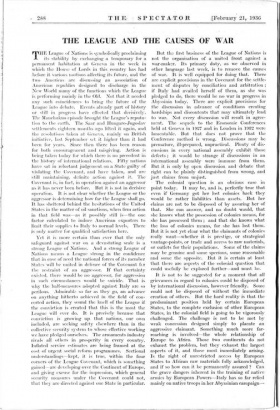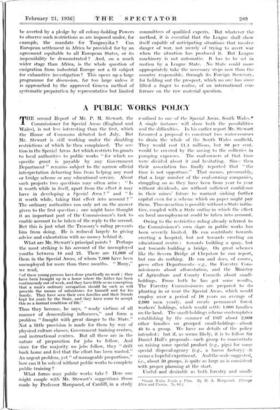THE LEAGUE AN]) THE CAUSES OF WAR
THE League of Nations is symbolically proclaiming its stability by exchanging a temporary for a .permanent habitation at Geneva in the week in :which the House of Lords in this country has. had :before it various motions affecting its future, and the two Americas are discussing an association of American republics designed to discharge in the New World many of the functions which the League is performing mainly in the Old. Not that it needed any such coincidences to bring the future of the League into debate. Events already part of history or still in progress have effected that decisively. The Manchukuo, episode brought the League's reputa- tion to the earth. The Saar and Hungaro-Jugoslav settlements eighteen months ago lifted it again, and the resolutions taken at Geneva, mainly on British initiative, last September set it higher than it had been for years. Since then there has been reason for both encouragement and misgiving. Action is being taken today for which there is no precedent in the history of international relations. Fifty nations have sat in reluctant judgement on a State guilty of violating the Covenant, and have taken, and are still maintaining, definite action against it. The Covenant is, in fact, in operation against an aggressor as it has never been before. But it is not in decisive operation. It is not clear whether the League or the aggressor is determining how far the League shall go. It has sheltered behind the hesitations of the United States in the matter of oil sanctions, when firm action in that field was—as it possibly still is the one factor calculated to induce American exporters to limit their supplies. to Italy to normal levels. There is only matter for qualified satisfaction here.
Yet it is more certain than ever that the only safeguard against .war on a devastating. scale is a strong League of Nations. And a strong League of Nations means a League strong in the confidence that in case of need the national forces of its member States will be united in defence of the Covenant fcr the restraint of an aggressor. If that certainty existed, there would be no aggressor, for aggression in such circumstances would be suicide. That is why the half-measures adopted against Italy are so perilous.. " Admirable so far as they go, an advance on . anything hitherto achieved in the field of con- certed action, they sound the knell of the League if the conviction is created that this is the most the League will ever do. It is precisely because that conviction is growing up that nations, our own included, are seeking safety elsewhere than in the collective security system to whose effective working we have pledged ourselves. The armaments industry rivals all others in prosperity in every country. Inflated service estimates are being framed at the cost of urgent social reform programmes. Sectional understandings—kept, it is true, within the four corners of the League Covenant, which is something gained—are developing over the Continent of Europe, and giving excuse for the impression, which general security measures under the Covenant could not, that they are directed against one State in particular. But the first business of the League of Nations is not the organisation . of .a united front against a war-maker. Its primary duty, as we observed in other language last week, is. to remove the causes of war. It is well equipped for doing that. There are explicit provisions in the Covenant for the settle- ment of disputes by conciliation and arbitration ; if Italy had availed herself of them, as she was pledged to do, there would be no war in progress in Abyssinia today. There are explicit provisions for the discussion in advance of conditions creating hardships and discontents that may ultimately lead to war. Not every discussion will result in agree- ment. The sequels to the Economic Conferences held at Geneva in 1927 and in London in 1982 were lamentable. But that. does not prove . that the Conference method is wrong. Discussions may be premature, ill-prepared, unpractical. Plenty of dis- cussions in every national assembly exhibit those defects ; it would be strange if discussions in an international assembly were immune from them. But it is only by open discussion. and • debate that right can be, plainly distinguished from wrong, and just claims from unjust.
The colonial question is an obvious case in point today. It may be, and is, perfectly true that even if Germany got her lost colonies back they would be rather liabilities than assets. But her claims are not to be disposed of by assuring her of that. She can answer, and no doubt would, that she knows what the possession of colonies means, for she has possessed them ; and that she knows what the loss of colonies means, for :she has lost .them. But it is not yet clear what the 'claimants of colonies really want—whether it is prestige, or strategical vantage-points, or trade and access to raw materials, or outlets for their populations. Some of the claims may be genuine and some specious, some reasonable. and some the opposite. But it is certain at least that there are aspects of the colonial question that could usefully be explored further—and must be.
- It is • not to be suggested for a moment that all grievances in regard" to colonieS could be disposed of by international discussion, however friendly. Some could not be • disposed of without -the immediate creation of others.-- But the lard reality is that the predominant position held by . certain European States, to the complete exclusion of other European States, in the colonial field is going to be vigorously challenged. The challenge is not to be met by weak concession designed simply to placate an aggressive. claimant. Something. much more far- reaching is involved—the whole relationship of Europe to Africa. Those two continents do not exhaust the problem, but they exhaust the largest aspects of it, and those most immediately arising. Is the right of unrestricted access by European States to African raw materials fully acknowledged, and if so how can it be permanently assured ? Can the grave dangers inherent in the training. of .native armies by. European ,Powers—Italy has so .far -relied mainly ,on-native-troops in. her Abyssinian campaign- be averted by a pledge by all colony-holding Powers to observe such restrictions as are imposed under, for example, the mandate for Tai4anyika ? Can European settlement in Africa be provided for by an agreement equitable to all European States, or its impossibility be demonstrated ? -And, on a much wider stage than Africa, is the whole question of emigration from industrial Europe not a fit subject for exhaustive investigation ? This opens up a large programme for discussion, far too large unless it is approached by the approved Geneva method of systematic preparation by representative but limited committees of qualified experts. . But whatever the method, :it is essential that the League shall show itself capable of anticipating situations that involve danger of war, not merely of trying to avert war when the situation has produced it. But League machinery is not automatic. It has to be set in motion by a League. State. No State could more appropriately take the necessary steps now than the country responsible, through its Foreign Secretary, for holding out the prospect, which no one has since lifted a finger to realise, of an international con- ference on the raw material question.















































 Previous page
Previous page